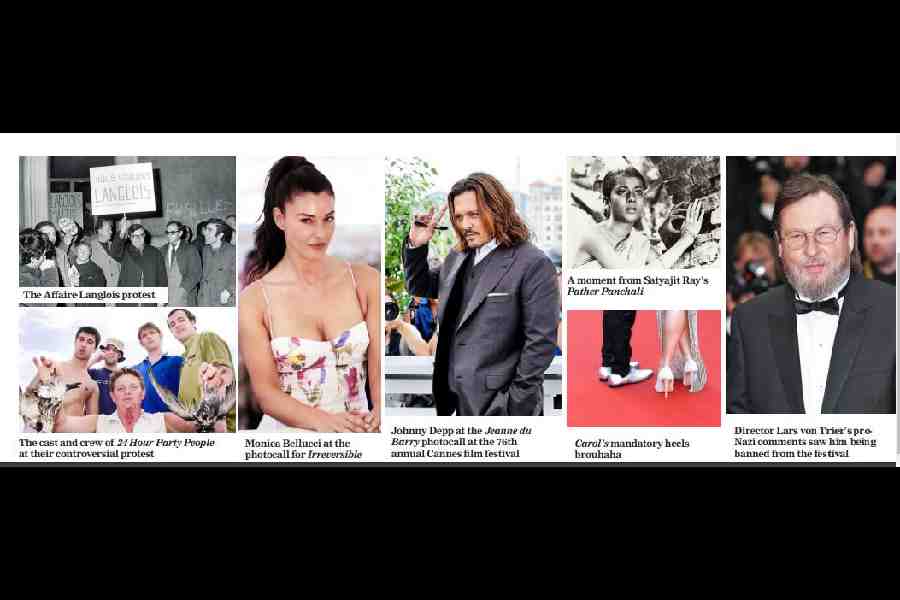The Festival de Cannes, renowned for its glitz, gala and glamour of cinema and beyond, has not been immune to its fair share of controversies. From clashes between directors and critics to scandalous films that pushed the boundaries of acceptability, to walkouts, Cannes has witnessed it all. t2 picks some memorable controversies.
GALLO VS EBERT: A BATTLE OF WORDS
One of the most famous controversies in Cannes history involved American actor-director Vincent Gallo and renowned film critic Roger Ebert. Gallo’s film The Brown Bunny premiered at the festival in 2003, receiving scathing reviews from critics, including Ebert, who famously declared it the “worst film in the history of Cannes”. In retaliation, Gallo called Ebert a “fat pig with the physique of a slave trader” during the film’s press conference, igniting a heated feud. Though there was a mutual settlement between the two parties, Ebert still gave a negative review of Gallo’s film even after it was recut. This kept the feud between Gallo and Ebert alive even in the future.
AFFAIRE LANGLOIS: A FIGHT FOR CINEMATIC HERITAGE
In 1968, Cannes was hit by a controversy referred to as ‘Affaire Langlois’. Henri Langlois, the co-founder of the Cinematheque Francaise, was dismissed from his position by culture minister Andre Malraux, due to his restrictive work culture. This sparked outrage within the film community. New Wave directors such as Jean-Luc Godard and Francois Truffaut were among those who protested, leading to the cancellation of the festival’s official screenings five days before schedule. This incident eventually led to the rehiring of Langlois and solidified the importance of preserving cinematic heritage.
JEANNE DU BARRY: JOHNNY DEPP’S PERSONAL VS PUBLIC PERSONA
This year, Cannes kicked off with a bang as well as a major controversy surrounding Jeanne du Barry, which was the opening film of the festival. Its lead actor Johnny Depp had been facing allegations of domestic abuse from his ex-wife Amber Heard and the much-televised trial of his case against Heard cast a shadow over Depp’s participation in the festival. Critics and activists accused the festival of turning a blind eye to these serious allegations by granting Depp such a prominent role. The controversy sparked intense debates about separating an artiste’s personal life from their professional achievements.
24 HOUR PARTY PEOPLE: PARTY OR PUBLICITY STUNT?
When you need publicity, you simply need publicity. In 2002, actor Steve Coogan, starring in the film 24 Hour Party People, raised eyebrows when he presented a live pigeon during a press conference. Coogan playfully interacted with the bird, even pretending to eat it. Furthermore, the cast of the film began playing with dead pigeons, somewhat playfully in the beginning but became attacking when the pace picked up in the waters in front of the Majestic Beach restaurant. Security had to usher them away. This act, perceived as disrespectful by some, caused an uproar among animal rights activists and divided opinions on the appropriateness of such behaviour in a prestigious festival setting.
IRREVERSIBLE: WALKOUT AND STANDING OVATION
In 2002, the screening of Gaspar Noe’s Irreversible left audiences stunned and deeply divided. The film depicted a graphic and brutal rape scene that lasted an astonishing nine minutes. The controversial scene caused walkouts, protests and heated debates about the boundaries of artistic expression. Despite the controversy, the film elicited a standing ovation that lasted for an unprecedented five minutes, highlighting the contentious nature of provocative cinema. Roger Ebert argued against the immature use of extensive sexual eroticism in Irreversible by portraying the chronological sequential stages of the film being more seductive in nature than the unceremonious order it was shot to provide a glimpse into the true juxtaposition between sex and violence.
PATHER PANCHALI: A CLASH OF ARTISTIC VISION
In 1956, Satyajit Ray’s debut film Pather Panchali faced a controversial reaction at Cannes when it won the ‘Prix du document humain’ or the Best Human Document award. Francois Truffaut, a member of the festival jury, initially deemed Ray’s masterpiece “unfit for competition” and also said that he did not want to see a “movie of peasants eating with their hands”. After protests from fellow jury members and the film community, Truffaut eventually recognised the film’s brilliance. In the 1970s, in an interview, Truffaut acknowledged that his comments were baseless and that he actually wanted to view the film over and over again to take into account its true brilliance.
HEEL UP!: CAROL’S DRESS CODE CONTROVERSY
In 2015, Cannes found itself embroiled in a controversy surrounding the dress code for the premiere of Cate Blanchett’s Carol. Several women were reportedly denied entry to the screening for not wearing high heels, which led to talk of sexism and an outcry for gender equality. The incident sparked a broader conversation about the festival’s dress code policies and the representation of women in the industry.
LARS VON TRIER: A PROVOCATEUR’S NAZI COMMENTS
Danish director Lars von Trier has never shied away from stirring up controversy, and Cannes became the performance stage for one of his most shocking moments. During a press conference for his film Melancholia in 2011, von Trier made provocative remarks, jokingly identifying himself as a Nazi and expressing sympathy for Adolf Hitler. His comments sparked an immediate backlash and led to him being banned from the festival.











